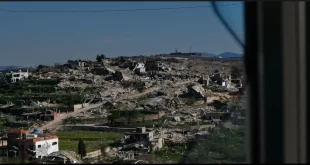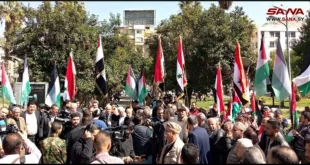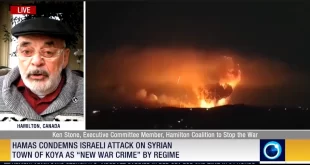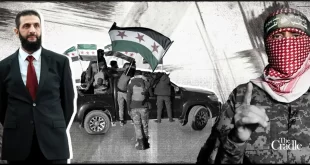Aug 8, 2015, Strategic Culture
At a meeting with UN Secretary-General Ban Ki-moon at the White House on Aug. 4, US President Barack Obama stated that Syria needs a «realistic political process» to settle its internal armed conflict, which would «lead to a stabilizing of the country and a transition to a government that is reflective of all the people of Syria». A few days earlier, the US president had authorized the use of US aircraft to defend the «moderate» Syrian opposition troops (trained by the Pentagon), in case they were attacked by the Syrian army. The Americans have already launched the first air strikes in support of the rebels.
National Security Council spokesman Alistair Baskey warned that Washington is ready to offer broader military aid to opposition forces in Syria. This will take the Syrian crisis – which has already gone on for four years – to a whole new level: for the first time US forces could be drawn into a direct clash with the Syrian army.
Washington still seeks regime change in Syria and the removal of Bashar al-Assad from power. The Military Times notes that for the first time since the air strikes against Syrian targets began a year ago, the US military now has an ally on the ground. Their small numbers do not bother the US president – what is important is the shift in the wind, and that is strong enough for the Americans to manifest a willingness for direct, armed intervention in Syria.
Russian Foreign Minister Sergei Lavrov stated at an Aug. 3 2015 press conference in Qatar that America’s plans are counterproductive and hampering the fight against the Islamic State (IS). Russia is pushing for an immediate end to foreign interference in the Syrian crisis and a stop to the bloodshed. Moscow is not offering its unconditional support to any party to this conflict, except for the Syrian people. But the Russians are in no way discounting the threat posed by IS. Russia is providing military and technical support to both Syria and Iraq in order to combat this threat, cooperating with the governments of both countries. «We have every reason to believe that, without this support, this terrorist organization (IS) would have captured hundreds or even thousands more square kilometers of territory», Russia’s top diplomat stressed.
The US administration prefers to ignore Russia’s role in the battle against the terrorists of the Islamic State, focusing instead on the Pentagon’s statistics.
Over the past 12 months, the US and its allies have carried out a total of nearly 6,000 attacks on IS positions (3,570 in Iraq and 2,267 in Syria). During this period, about 17,000 bombs and missiles were dropped and delivered. However, given the current scuffle over the White House being waged between the Democrats and Republicans, it is becoming increasingly difficult for President Obama to explain to voters why the measures his administration has taken against IS have been so ineffective. After all, they have spent a lot of money with nothing to show for it. For example, it costs between $1,000 (for a Predator or Reaper) and $7,000 (for a Global Hawk)per hour to fly a reconnaissance drone.
One quarter of all the staff of the CIA and other intelligence agencies are employed as part of counter-terrorism programs, and that price tag tops $15 billion each year.
But despite all this, IS is only getting stronger. That terrorist pseudo-state has found sources of self-financing (the air strikes have not stopped oil production), is imposing its rule in the vast areas seized last year in Syria and Iraq, and quickly replenishes its ranks depleted by combat casualties, using mercenary «jihad warriors» from around the world. According to US intelligence estimates, IS controls about 30,000 combat troops. IS is gradually carving out a zone of influence in Libya, Egypt, and Afghanistan. This is ultimately less than reassuring, and it leaves the Obama administration increasingly vulnerable to criticism from his Republican opponents.
Meanwhile President Obama is maintaining his insistence on a regime change in Damascus. And in its relations with Baghdad, the current US administration is more fearful of Tehran’s growing influence in Iraq than the actual threat posed by IS. The White House has still not made up its mind what is more important in the Middle East – fighting against the growing power of IS terrorists or continuing its own confrontation with both Syria and her backer, Iran.
Meanwhile, America’s Arab allies in the Gulf will not commit themselves to anything beyond declaring their intention to fight IS. Saudi Arabia has engineered a war with Yemen in order to prevent Iran’s influence from expanding there. By destroying Yemen’s Shiite Houthis, Riyadh is striking a blow at Tehran, which, it must be said, is providing quite substantial support to the government of Iraq in its confrontation with the forces of the Islamic State in the east. It is telling that, under the onslaught of Shiite militias, IS is pulling back and losing the areas it had previously occupied in Iraq’s eastern regions on the Iraqi border.
Obama’s decision to render military support to the pro-American opposition in Syria looks like a calculated maneuver. There is now a danger that America’s NATO allies might also enlist in this adventure. Air strikes will be launched from air bases in Turkey, so if Syria decides to retaliate, the war will then spill over that country’s borders.
Information has already come to light about the actions of British special forces in Syria. The Sunday Express reportsthat more than 120 British military elite units, dressed in black and flying IS flags, have attacked Syrian government forces. Both the armed-conflict zone in Syria, as well as the scale of NATO’s intervention in that country, are expanding under the guise of combating terrorist factions. This threatening sequence of events suggests the possibility that the Libyan scenario could be repeated.
 Syria Support Movement solidarity with the Syrian people
Syria Support Movement solidarity with the Syrian people




